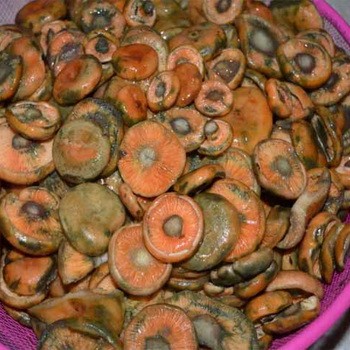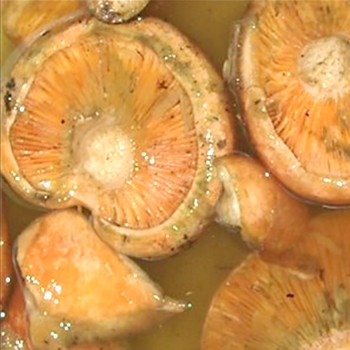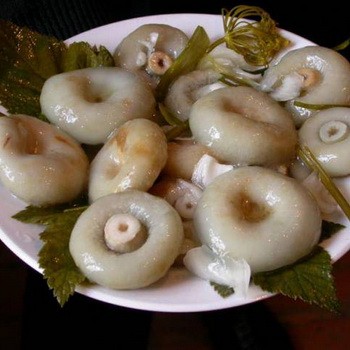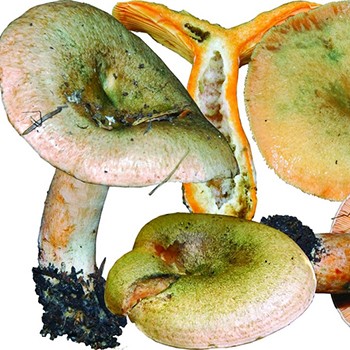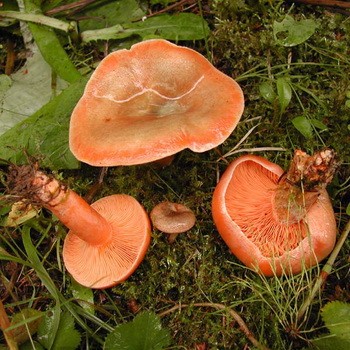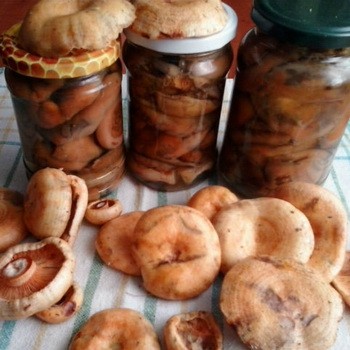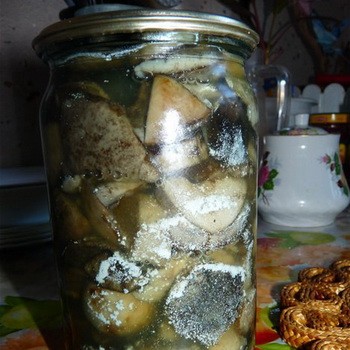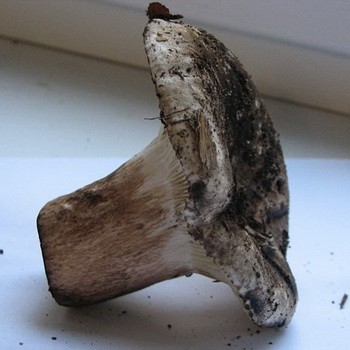Why do mushrooms turn black when salting, boiling, soaking and what to do?
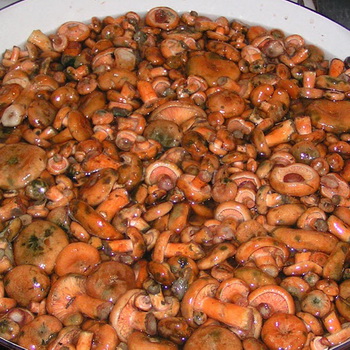
Most housewives are very fond of canning saffron mushrooms, as well as prepare the first and second dishes from them. Any dish of these mushrooms will certainly conquer even the most capricious gourmet. However, in the process of processing one unpleasant feature may be revealed: saffron milk blacken. Most often this happens when salting, cooking or soaking. This unpleasant picture immediately spreads panic among the hostesses, as it raises the idea that the product has become unusable. But is the situation as hopeless as it seems at first glance? If the saffron milk has turned black, is it possible to eat them?
Interestingly, saffron mushrooms are the only fruiting bodies that have thick and sweet milky juice. This suggests that such mushrooms do not need to be soaked, like other milkers. In addition, eating saffron mushrooms does not cause a feeling of heaviness in the stomach. These gifts of nature can rightfully be considered one of the best candidates for pickling, pickling, frying, etc.
So, is it dangerous to eat mushrooms that have darkened? No, it’s not dangerous, because such a feature can appear for various reasons that are completely irrelevant to possible poisoning. To understand why mushrooms turn black after salting, boiling and other processes, you must first take into account various factors, which will be discussed in this article. Knowing about them, each mistress will be able to correctly determine the degree of darkening of the fruiting bodies, as well as provide "first aid" if necessary. In addition, this article provides practical tips showing what you can do to prevent mushrooms from blackening.
Content
- Why did the mushrooms turn black during salting and a photo of the blackened mushrooms
- Reasons why blackheads turn black during cold salting
- What to do if salted saffron mushrooms turn black and how to salt mushrooms properly?
- Why did the brine turn black when salting mushrooms and what should I do if the surface turns black?
- Reasons why blackheads turn black while soaking
- What needs to be done so that boiled mushrooms do not turn black?
Why did the mushrooms turn black during salting and a photo of the blackened mushrooms
As already noted, salted mushrooms is the most popular method of processing. By their nature, these fruiting bodies have a pleasant orange color. However, after salting, they can turn black, which can completely ruin their appetizing appearance. Sometimes such a problem may occur a couple of days after the start of pickling, or it may take a month or two before this happens. But if blackened saffron milk has no unpleasant odor and any mold, then as a rule, there is nothing wrong with that. Just darkened salty fruit bodies are not a pleasant sight. So, why then do saffron milk blacken during salting, if there are no obvious signs of corruption? There are several reasons for this:
- Ginger was not completely immersed in brine.Upon contact with air, the flesh of the mushroom blackens, but this is an absolutely safe phenomenon, which is not a sign of inedibility and does not affect the taste. If there is no desire to eat such mushrooms as an independent snack, then they can be fried or added to the soup.
- Different types of camelina were collected, for example, spruce. It is known that this type of fruiting bodies can turn black with various types of processing.
- During salting, many spices were added. So, saffron milk does not need a lot of spices, often just one salt is enough. For example, dill seeds can cause blackness in mushrooms.
Some of the reasons why the saffron milk turned black during salting are shown in the photo:
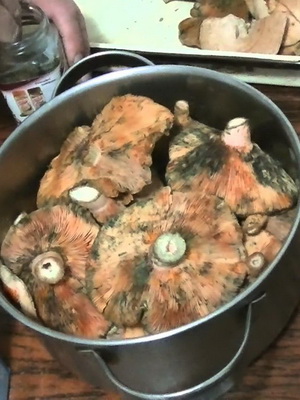
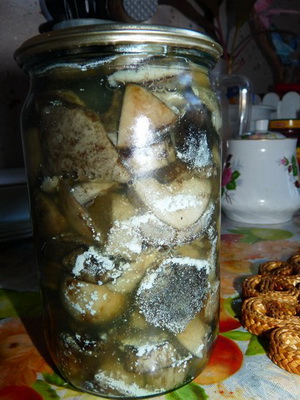
Reasons why blackheads turn black during cold salting
Interestingly, but most often saffron milk blacken with cold pickling, why is this happening? As in the case of hot salting, the following reasons can be added to all of the above:
- Redheads were in the open air for a long time before pickling. This often happens with purchased fruiting bodies. The longer the fresh mushrooms wait for processing, the more likely they will turn black after salting.
- Mushrooms were collected in contaminated places, near industrial enterprises and highways.
- In the process of collecting mushrooms could wrinkle. If you press on the flesh of a fresh mushroom, then this area darkens, and when salted, it turns black.
- During storage of saffron mushrooms improper conditions were observed, for example, in warmth or in sunlight.
- Ready mushrooms were stored for a long time in an open bank. Even the first discovery of conservation violates its environment, so the oxidation process begins to go faster.
What to do if salted saffron mushrooms turn black and how to salt mushrooms properly?
What to do if salted saffron mushrooms have turned black, can they be eaten and subjected to further culinary manipulations? Yes, it is possible if the conditions of pre-processing and storage of the finished product were correctly observed. In this case, the color change is absolutely normal for this type of fruiting bodies. If the blackened mushrooms do not cause your appetite, use them in the first and second courses, as well as for the preparation of salads and sauces.
And what is the best way to salt the mushrooms so that they do not turn black? Here are some suggestions:
- Carry out careful transportation so that mushrooms do not crumple.
- Mushrooms must be processed immediately after harvesting.
- Limited to a minimum number of spices.
- Make sure that the mushrooms are completely immersed in brine.
- Cover salted saffron mushrooms in jars with a volume of not more than 1 liter.
- Store preservation in a dark and cool room, the temperature of which does not exceed + 10 °.
- Pick mushrooms only in proven, ecologically clean places.
Why did the brine turn black when salting mushrooms and what should I do if the surface turns black?
Many housewives are interested in why, during salting of saffron mushrooms, the brine turned black. This happens infrequently, and as a result, it can be very scary. Sometimes such an unpleasant feature can really become a cause for concern. But if there is no unpleasant smell and black mold in the brine, then nothing bad happened. You can safely eat them, after rinsing in water. Otherwise, if black mold is visible on the darkened brine, then the mushrooms should be discarded without sparing the time and effort spent.
So, why can the salted saffron brine turn black? It should be noted that the brine in salted saffron mushrooms should have a rich dark brown color, this indicates its quality condition. So, if mushrooms are crushed during the collection process, were poorly processed, stored incorrectly, and often came in contact with air, then this can affect the color of the brine. The same can be said about when salted mushrooms pickle blackens only on the surface.
What to do if pickle turned black in saffron milk, what recommendations exist for this? It is necessary to remove the top layer of mushrooms, and drain the liquid.Then rinse the mushrooms, pour them again with salt and pour new brine. In addition, if you want to play it safe, then boil the mushrooms for 10 minutes and salt them hot.
Reasons why blackheads turn black while soaking
As already mentioned, saffron milk does not need to be soaked, since it belongs to the 1st category of edibility. However, some housewives still consider it necessary to soak these fruiting bodies for several hours. Often this process helps with severe contamination in fungi. But sometimes when soaking it is found that the saffron milk blackens, why is this happening?
- The main cause of blackening of saffron milk when soaked is their contact with air. Perhaps at that time not all mushrooms were in the water. This is a natural reaction and there is nothing wrong with that. It must be ensured that the product has been completely immersed in water. In addition, it is better to add a little salt to the water.
- In addition, if the mushrooms are soaked in a metal dish, this can also lead to oxidation, and the product will turn black. Therefore, it is necessary to use any non-metallic container.
What needs to be done so that boiled mushrooms do not turn black?
Sometimes saffron mushrooms turn black during cooking, why does this happen? And although black saffron mushrooms do not take on the most appetizing appearance, yet it is absolutely safe. There are also several reasons for this:
- Almost all mushrooms react with the air and turn black, and saffron mushrooms are no exception. During heat treatment, this reaction is significantly accelerated.
- As in the case of soaking, saffron mushrooms are oxidized during cooking if metal utensils are selected.
But what can be done so that boiled mushrooms do not turn black?
- When cooking, add salt and citric acid to the water, which will help keep the mushrooms attractive appearance.
- Carry out heat treatment exclusively in enameled dishes, without chips and damage.
- Rinse the mushrooms thoroughly before boiling in ice water with the addition of vinegar.
